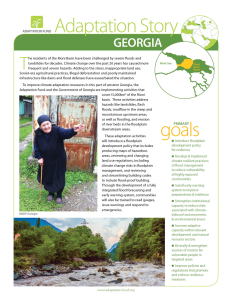Flooding in the Rioni River Basin has exacted ever-greater tolls on the economy and lives of residents, 40 percent of whom are impoverished. Between 1842 and 2008, 111 incidents of flooding were recorded in the basin with losses ranging from 200,000 to 60 Million USD. The number of flooding events per year has increased in the last decade, with seven events occurring in 2005, six of which were categorized as “strong.” With flood frequency and the occurrence of landslides, flash-floods and mudflows projected to increase, the project objective is to help the governments and the population of the Rioni River Basin to develop adaptive capacity and embark on climate-resilient economic development.
The project, implemented by the United Nations Development Programme (UNDP) aims to assist government officials by introducing a floodplain development policy. The policy development process includes producing hazard and inundation maps, reviewing and changing land use regulations, internalizing climate change risks into floodplain management and spatial planning, and reviewing and streamlining building codes to flood-proof new buildings. It would also arrange targeted training for those national and local authorities who are responsible for climate risk management in advanced methods of forward-looking climate risk management planning and flood prevention measures, and design and implement a community-based flood insurance scheme that would cover highly exposed villages under municipalities. The project would also design flood management practices such as bank terracing, vegetative buffers, and tree revetments, and seasonal land use appropriate for flood plains (e.g. short-season annual cropping, or seasonal cattle pastures). The project will also include the establishment of a flood early-warning system.
Learn more
- Project video: Adaptation Fund in Georgia
- Adaptation Story: Georgia
- Photos from AF Field Monitoring Mission in 2017
- Project video by the UNDP: The Story of Floods
- UNDP project story: A happy place once more
- UNDP Project page and infographic about the project
- In the news: “Project snapshot: Georgia after the flood” on UNDP’s “Voices from Eurasia”
- UNDP Project Story: “Floods swept away her cattle and chickens – with UNDP help, Eteri Shavladze is fighting back”
- UNDP: Climate Resilient Flood and Flash Flood Management
- UNDP: Studies on Flood and Flash Flood Management Practices
| Project Component 1: Floodplain development policy introduced to improve long term resilience to flood / flash flood risks | USD 670,000 |
| Project Component 2: Climate resilient practices of flood management developed and implemented to reduce vulnerability of highly exposed communities | USD 2,900,000 |
| Project Component 3: Early warning system in place to improve preparedness and adaptive capacity of population | USD 1,000,000 |
| Project/Programme Execution Cost | USD 330,000 |
| Total Project/Programme Cost (= Project Component + Execution Cost) | USD 4,900,000 |
| Implementing Fee | USD 416,500 |
| Grant Amount (= Total Project/Programme Cost + Implementing Fee) | USD 5,316,500 |
Project Documents
| Attachment | Type | Size |
|---|---|---|
| Project document | 2 MB | |
| Mid-term evaluation report | 985 KB | |
| Final evaluation report | DOCX | 145 KB |
| PPR3 (for web) | XLS | 333 KB |
| PPR1 (for web) | XLSX | 141 KB |
| PPR2 (for web) | XLSX | 143 KB |
| PPR4 (for web) | XLSX | 163 KB |



